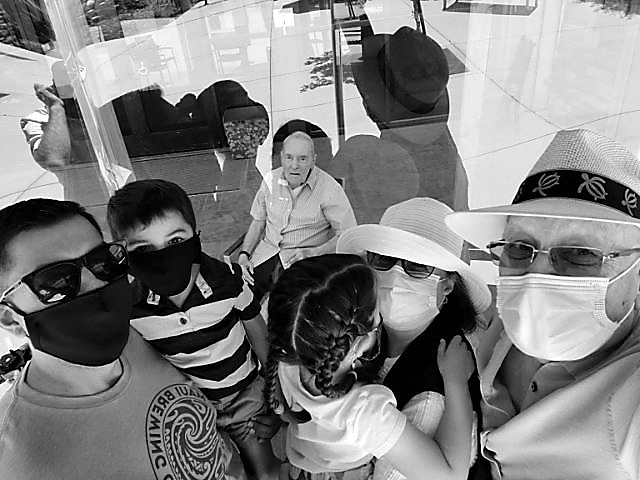
WAKE SHARP got to see his family on Father’s Day — see them, not hug them, not kiss them, not even shake hands. Because of the terrible toll taken by the coronavirus on older people in nursing homes and other institutions in the U.S., the 93-year-old Navy veteran and his loved ones had to stay on opposite sides of a plexiglass barrier and talk by phone at the assisted-living home outside San Francisco where he is a resident. “It’s better than nothing!” he said. “I really enjoy it.” Dads at nursing homes across the country marked Father’s Day at a forced distance from their families Sunday. Some families relied on video calls; others used social media to send their wishes. The virus has made in-person visits with elderly and high-risk family members difficult and sometimes impossible in recent months, though parts of the country have begun loosening up. Maryland and Illinois were among states that allowed outdoor visits at nursing homes with masks and six feet (1.8 meters) of distance. Frank Wolff, his wife and their son visited his 91-year-old father on a patio outside his Chicago assisted-living home on Father’s Day. The staff took everyone’s temperature and followed all other regulations. “It was good to see him and get a feeling for how he’s really doing,” said Wolff, who hadn’t seen his father, Howard Wolff, since Illinois shut down in mid-March. Sharp got to see his family through a plexiglass cubicle built by a staff member for Rockville Terrace, the home in Fairfield, California, where Sharp lives. Four generations of the Sharp family gathered in a courtyard. The eldest among them, arriving with the help of his walker, took a seat inside the three-sided box with phone in hand, talking with family members on the outside on one of their phones. “We hug each other through the glass,” said Sharp, who hasn’t had a real hug from them in a long while. This wasn’t the first time they visited that way. “I don’t know who enjoys it more. My family and I – or dad,” said son Dan Sharp, who lives in Novato, California. He paused, then added, “Probably dad.” Rockville Terrace also had a car parade with families with signs for Father’s Day and a barbecue so the dads could have steaks and burgers. The coronavirus has killed an estimated 120,000 people nationwide. As of mid-June, more than 45,500 residents and staff had died from outbreaks at nursing homes and other long-term care facilities, according to a running count by The Associated Press. That was about 40 percent of the total deaths from the scourge at the time. Nursing homes have been among the last places to loosen restrictions. Families and nursing home officials worry about the effects the isolation is having on residents’ mental health. While video calls have helped, Rockville Terrace’s plexiglass cubicle — which creator Jason Reyes jokingly calls the “Sneezeguard 3000” — is another possible solution. It was introduced in April. “It’s not back to normal … but it helps,” said Reyes, a managing partner of Calson Management, a company with seven facilities in California. He said he was driven to build the 128-square-foot (12-square-meter) enclosures after so many residents and family members were distraught when they couldn’t see one another. “The whole situation just tugged on the heartstrings,” Reyes said, noting that demand for cubicle visits — each resident’s session with family lasting an hour on weekdays and 30 minutes on weekends — has been strong at the three facilities where they have them. (SD-Agencies) | 
